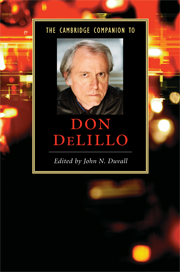Book contents
- Frontmatter
- Introduction: The power of history and the persistence of mystery
- PART I AESTHETIC AND CULTURAL INFLUENCES
- PART II EARLY FICTION
- PART III MAJOR NOVELS
- PART IV THEMES AND ISSUES
- 9 DeLillo and masculinity
- 10 DeLillo's Dedalian artists
- 11 DeLillo and the power of language
- 12 DeLillo and mystery
- Conclusion: Writing amid the ruins: 9/11 and Cosmopolis
- Select bibliography
- Guide to further reading
- Index
- Series List
12 - DeLillo and mystery
from PART IV - THEMES AND ISSUES
Published online by Cambridge University Press: 28 June 2008
- Frontmatter
- Introduction: The power of history and the persistence of mystery
- PART I AESTHETIC AND CULTURAL INFLUENCES
- PART II EARLY FICTION
- PART III MAJOR NOVELS
- PART IV THEMES AND ISSUES
- 9 DeLillo and masculinity
- 10 DeLillo's Dedalian artists
- 11 DeLillo and the power of language
- 12 DeLillo and mystery
- Conclusion: Writing amid the ruins: 9/11 and Cosmopolis
- Select bibliography
- Guide to further reading
- Index
- Series List
Summary
A discrimination of mysteries
Like many postmodern novelists, Don DeLillo plays seriously with the forms of popular fiction. He draws regularly on the forensic plotlines of detective mysteries and espionage fiction. Who is plotting to blow up the New York Stock Exchange (Players) (1977)? Who has the film of Adolf Hitler's last days (Running Dog) (1978)? For whom is James Axton really working (The Names) (1982)? Who has Dylar, the drug that supposedly represses the fear of death (White Noise) (1985)? Who killed JFK (Libra) (1988)? The plots of esoteric fiction, filled with quests for secret knowledge and cosmic conspiracies, also fascinate him. The Names features a search for a secret cult obsessed with obscure languages and ritual murder, and Libra muses, as its title indicates, over the secrets encoded in the esoteric systems of astrology. In these popular narrative traditions, all mysteries are for solving, all disruptive forces can be managed, and human dignity is closely linked to the acquisition of exact knowledge.
But DeLillo is preoccupied as well with a third and very different discourse of mystery. Many of his novels – including Players, The Names, White Noise, Mao II (1991), and Underworld (1997) – climax in dramatic episodes of worshipful communion that recall the religious “mysteries” of DeLillo's Catholic heritage. In these episodes characters unfulfilled by quests for knowledge and control or by practices of privileged superficiality find comfort in experiences of sacramental communion that recall the “mysteries” of the Catholic sacraments, sacred practices that channel grace to those who perform them from sources that cannot be fully understood.
- Type
- Chapter
- Information
- The Cambridge Companion to Don DeLillo , pp. 166 - 178Publisher: Cambridge University PressPrint publication year: 2008
- 1
- Cited by

